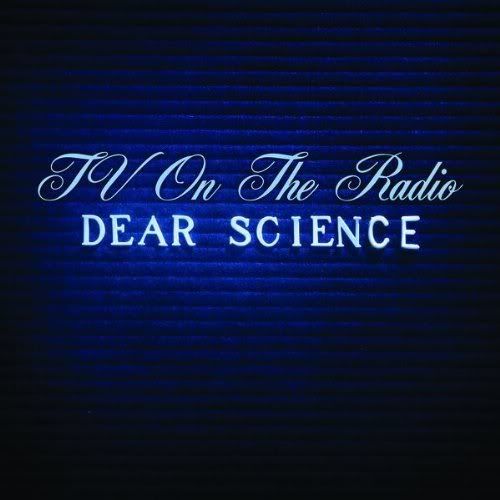 If I were to make a list of my most anticipated albums of the year, perhaps only Portishead's Third would have placed higher on that list than TV on the Radio's Dear Science. After the triumph that was Return to Cookie Mountain, two major questions trailed the band on the follow-up; could they top it and are they capable of appealing to a wider audience in the process? After listening to Dear Science several times in the last few days I think the answer to both questions is a resounding yes.
If I were to make a list of my most anticipated albums of the year, perhaps only Portishead's Third would have placed higher on that list than TV on the Radio's Dear Science. After the triumph that was Return to Cookie Mountain, two major questions trailed the band on the follow-up; could they top it and are they capable of appealing to a wider audience in the process? After listening to Dear Science several times in the last few days I think the answer to both questions is a resounding yes.Thematically the songwriting of Kyp Malone and Tunde Adebimpe explores the difficulties of navigating and interpreting a world wrought with despair and uncertainty. In some instances these ideas are realized in the form of confrontation ("Red Dress", "DLZ"), while at others the emotions flow from bleakness ("Crying") to hope ("Shout Me Out") to full-on exuberance ("Golden Age"). TV on the Radio are definitely maladjusted to the current political and social realities of the times, and the gamut of emotions exhibited on this album lend themselves to various forms of creative expression.
Musically Dear Science isn't nearly as much of a whirlwind of noise and layers upon layers of production as Return to Cookie Mountain. Producer/guitarist Dave Sitek manages to compartmentalize the band's art rock tendencies (of which there are many) into more accessible bursts of experimentation. If Return to Cookie Mountain was a series of cluster bombs to the senses, then Dear Science is a sonic cruise missile (forgive me for the war metaphor). As a result, many of the rhythms and melodies on this album are the most accessible the band has made to date, with some producing (dare I say it?) brief flirtations with pop music.
Opening track "Halfway Home" is perhaps one of the three best songs the band has ever done. Sitek's buzzing guitar drone swims along a wave of syncopated hand claps and drums while Adebimpe sings the infectiously catchy and simple lyric "ba ba ba ba ba bum, ba ba ba ba bum" before the fireworks finally go off in the last third of the song.
After the smoke clears we are treated to the wonderfully melancholy "Crying", which is the closest thing to pop as you're ever going to get with this band. Sitek effectively blends funk guitar, avant jazz horns (courtesy of Antibalas Afrobeat Orchestra channeling their inner John Zorn), and 8-bit synths into a seamless pop groove that only a handful of artists could pull off.
"Golden Age" finds TVOR giving a not-so-subtle nod of recognition to Prince with its funk-pop backdrop and falsetto verses, yet mixes it with strings, horns and electronic noise to create a hodgepodge of sounds that doesn't sound nearly as convoluted as my description may indicate. While on "Family Tree" the bands strips everything down and manages to pull off the delicate balancing act of the rock ballad. Unsurprisingly they nail their first foray into this territory, whereas a band like Block Party still fails to get it right after numerous attempts.
Perhaps the heaviest groove on the entire album is the mashup of bass, bongos and cymbal rush found on "DLZ." The tension manages to build throughout as sampled electronic gizmos, guitar noise and vocals are layered on top of each other until the song reaches a boiling point and then suddenly sheds it weight at the end.
Two years ago I wondered if TV on the Radio could possibly top Return to Cookie Mountain. Now, I'm wondering if the ceiling for this band is even viewable from my vantage point. The way they mix together artistic indulgences and pop hooks on Dear Science is perhaps the most difficult thing to pull off in rock music, yet it never manages to sound labored. The future is bright for this band and I couldn't be more excited to stick around to see how it all unfolds.



No comments:
Post a Comment